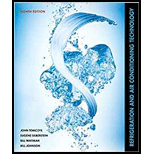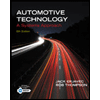
Where would a technician encounter freezing temperatures when working with liquid refrigerant?
The condition where the technician will encounter the freezing temperatures while working with liquid refrigerant.
Answer to Problem 1RQ
A technician will encounter a freezing temperature when the liquid refrigerant gets mixed with the atmosphere and absorbs the heat to produce a cooling effect.
Explanation of Solution
While working with the liquid refrigerants, it is essential to take preventions before doing any operation with liquid refrigerants. Liquid refrigerants can be harmful in nature. Liquid refrigerant can cause a high temperature drop, if it leaks out of the cylinder.
When liquid refrigerant leaks out from the cylinder it produces a drop in local temperature as, the liquid refrigerant absorbs heat from the surroundings and cool it down to a lower temperature.
As a technician is working with liquid refrigerant, he will feel a freezing temperature when there is a leak in cylinder.
Conclusion:
Thus, a technician will encounter a freezing temperature when the liquid refrigerant gets mixed with the atmosphere and absorbs the heat to produce a cooling effect.
Want to see more full solutions like this?
Chapter 4 Solutions
REFRIGERATION+AIR COND.TECH.-W/2 ACCESS
- Solve this problem and show all of the workarrow_forwardSolve this problem and show all of the workarrow_forwarddraw the pneumatic circuit to operate a double-acting cylinder with: 1. Extension: Any of two manual conditions plus cylinder fully retracted, → Extension has both meter-in and meter-out, 2. Retraction: one manual conditions plus cylinder fully extended, → Retraction is very fast using quick exhaust valve.arrow_forward
- Correct answer is written below. Detailed and complete solution with fbd only. I will upvote, thank you. Expert solution plsarrow_forwardCorrect answer is written below. Detailed and complete solution with fbd only. I will upvote, thank you.arrow_forwardCorrect answer is written below. Detailed and complete solution with fbd only. I will upvote, thank you.arrow_forward
- Correct answer is written below. Detailed and complete solution only with fbd. I will upvote, thank you.arrow_forwardCorrect answer is written below. Detailed and complete solution only. I will upvote, thank you.arrow_forwardCorrect answer is written below. Detailed and complete solution with fbd only. I will upvote, thank you.arrow_forward
- Correct answer is written below. Detailed and complete solution only. I will upvote, thank you.arrow_forwardCorrect answer is written below. Detailed and complete solution with fbd only. I will upvote, thank you.arrow_forwardCorrect answer is written below. Detailed and complete solution only. I will upvote, thank you.arrow_forward
 Refrigeration and Air Conditioning Technology (Mi...Mechanical EngineeringISBN:9781305578296Author:John Tomczyk, Eugene Silberstein, Bill Whitman, Bill JohnsonPublisher:Cengage Learning
Refrigeration and Air Conditioning Technology (Mi...Mechanical EngineeringISBN:9781305578296Author:John Tomczyk, Eugene Silberstein, Bill Whitman, Bill JohnsonPublisher:Cengage Learning Automotive Technology: A Systems Approach (MindTa...Mechanical EngineeringISBN:9781133612315Author:Jack Erjavec, Rob ThompsonPublisher:Cengage Learning
Automotive Technology: A Systems Approach (MindTa...Mechanical EngineeringISBN:9781133612315Author:Jack Erjavec, Rob ThompsonPublisher:Cengage Learning

